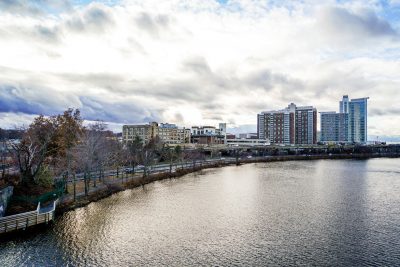Environmental advocates at BU are taking action to reduce the school’s environmental impact in response to a National Climate Report released Nov. 23 by the United States Global Change Research Program.
The report, which is the USGCR’s fourth since 2000, describes the current and projected impacts that climate change could have on the United States. The 2018 report predicts detrimental impacts on the economy, infrastructure, tourism, agriculture and air quality, among other areas.
Anthony Janetos, director of the Frederick S. Pardee Center for the Study of the Longer-Range Future and chair of the Department of Earth and Environment, has worked on all four reports and said that people should take its findings seriously.

“It’s a pretty stark reminder that the U.S. is already experiencing these impacts,” Janetos said. “They’re serious and warrant a response.”
BU’s Climate Action Plan, which was adopted in Dec. 2017, focuses on decreasing the university’s greenhouse gas emissions and increasing its resilience to environmental changes. Janetos said the plan includes a goal to reduce the university’s net carbon emission to zero by 2040.
In September, BU announced that it had signed an agreement to purchase renewable energy from a wind farm in South Dakota. The purchase will offset all of the university’s emissions from electricity — which is more than half of its total emissions — according to Janetos.
Lisa Tornatore, sustainability director for Sustainability@BU, said that one way the university is responding to climate change is by constructing flood-resistant buildings with mechanical and electrical equipment on higher floors to eliminate potential damages in the future.
Both the Rajen Kilachand Center for Integrated Life Sciences and Engineering, which opened in September 2017, and the planned data sciences center to be constructed at the corner of Commonwealth Avenue and Granby Street, follow the “elevation for resilience” recommended in the university’s Climate Action Plan, Tornatore said.
“This means our buildings and our people will be able to recover more quickly from a flooding event,” Tornatore said.
For the United States as a whole, Janetos said that the country’s economy is expected to lose hundreds of billions of dollars due to greenhouse gas emissions by the end of the century.
“If there is no response in terms of adaptation and emissions continue as they are, the U.S. could end up seeing a loss in economic productivities that is 5 to 10 percent of our annual GDP,” Janetos said. “That’s certainly big enough that it shouldn’t be ignored.”
According to Janetos, some of these damages are already in effect. The government report says the United States will experience “more frequent and intense extreme weather and climate-related events” in the coming years as a result of changes in average climate conditions.
These effects can also be seen in Boston, Janetos said, referring to a nor’easter in March that caused flooding in the city and other coastal communities in Massachusetts.
Above all, Janetos said, students should understand the urgency of climate change.
“This is not an issue that is just for our children, grandchildren and far off generations in the future,” he said. “We are seeing these impacts right now. These impacts are happening faster, more frequently and at greater magnitude than we had imagined when we first started off.”
BU students said that it is necessary to take action to improve the current, and predicted, state of the environment.
Dev Mehrotra, a junior in the College of Engineering, said he thought the issue of climate change deserves more attention.
“I think this is something that needs to get looked into more because it is a very real problem,” Mehrotra said. “I think the issue is some people may not really see the direct effects, but they are still there.”
Zoe Dewitt, a College of Communication sophomore, said that she hopes the report will encourage people to take sustainability more seriously in the future.
“We already see things like the California wildfires, hurricanes and the fact that it hasn’t really snowed here in Boston,” DeWitt said. “It’s scary. It’s just going to get worse. We really do need to do something to stop it.”
- Anthony Janetos
- Boston University
- BU’s Climate Action Plan
- California wildfires
- Chair of the Department of Earth and Environment
- Climate Action Plan
- Climate Report
- College of Arts and Sciences
- College of Communication
- College of Engineering
- Corner of Commonwealth Avenue and Granby Street
- data sciences center
- Dev Mehrotra
- financial district
- Frederick S. Pardee Center for the Study of the Longer-Range Future
- Global Change Research Act of 1990
- Kilachand Center for Integrated Life Sciences & Engineering
- Lisa Tornatore
- Nichole Andoh
- power purchasing agreement
- Sustainability Director at BU
- United States
- United States Global Change Research Program
- US Government
- Zoe Dewitt






















































































































